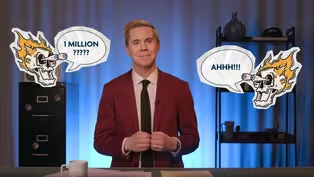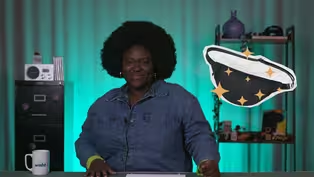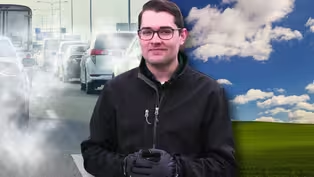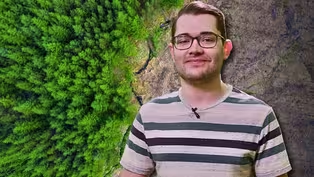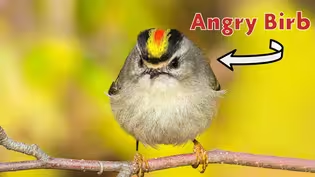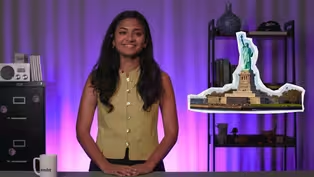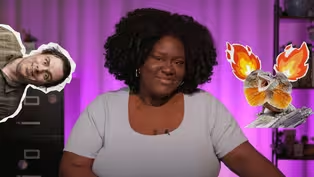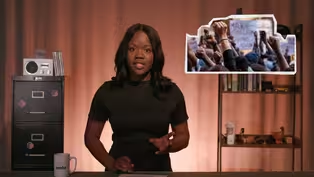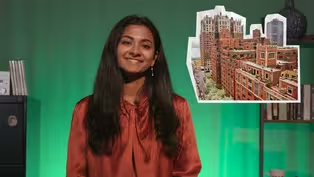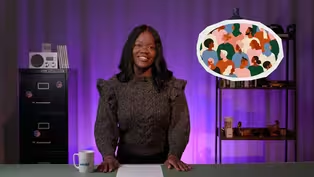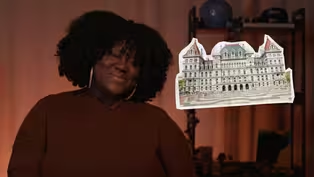
NY& Organizing
Clip: Special | 8m 38sVideo has Closed Captions
Learn about the basics of organizing, its importance, and the potential community impact.
Join our host Raga Justin as she explains the basics of organizing, its importance, and the impact it can have on communities.
Problems playing video? | Closed Captioning Feedback
Problems playing video? | Closed Captioning Feedback
New York NOW is a local public television program presented by WMHT
Support provided by the New York State Education Department.

NY& Organizing
Clip: Special | 8m 38sVideo has Closed Captions
Join our host Raga Justin as she explains the basics of organizing, its importance, and the impact it can have on communities.
Problems playing video? | Closed Captioning Feedback
How to Watch New York NOW
New York NOW is available to stream on pbs.org and the free PBS App, available on iPhone, Apple TV, Android TV, Android smartphones, Amazon Fire TV, Amazon Fire Tablet, Roku, Samsung Smart TV, and Vizio.
Providing Support for PBS.org
Learn Moreabout PBS online sponsorship(gentle upbeat music) - Welcome to "New York and Organizing."
I'm your host, Raga Justin.
Looking back earlier in this series, we talked about how voting is a crucial, easy, and impactful way to be civically engaged.
But voting is far from everything.
Sometimes elections can feel like they lack meaning.
Maybe some of your local officials run unopposed.
Maybe some politicians get voted in and then don't do what they say they're going to do.
This is all to say voting is foundational and incredibly important, but it's just one of the many tools you have in your tool belt for affecting change.
When people express concerns about deep-rooted issues in our society, you can't just simply say, "Go vote," and act like that is the cure-all to bad governance.
This is why we wanted to focus on organizing as a way to be meaningfully civically engaged beyond casting your vote.
In this episode, we'll go over the concept of organizing, the work that goes into it, and ways you can get involved.
(gentle upbeat music) Being a show that focuses on the impact of state and local government, it's fundamental to recognize that policies impact people's lives, they impact your life.
But as an individual, it might not feel like you have the power on your own to challenge those in power.
But that's where organizing comes in.
We are going to start by highlighting community organizing.
Folks at the Jonathan M. Tisch College of Civic Life at Tufts University describe community organizing as "a set of methods, practices, and strategies that address public problems and also strengthen people's capacity to work together and exercise power."
Organizers bring people together under a unifying idea or goal so the group can utilize the collective efforts of folks to achieve the change that they wanna see.
Let's say a city's cost of housing skyrockets over a period of time.
Residents of that city could get together to come up with ways to alleviate the issue, connect with other housing-focused organizations, and use their combined power to influence local policy makers and officials into passing policies that will alleviate housing costs.
But what does the nitty gritty of the organizing process look like?
What work goes into getting people together and striving to achieve goals?
We asked Tabetha Wilson, board president of AVillage, an Albany-based organization working to improve the lives of folks who live in the city's underserved neighborhoods.
- So I do think it starts with coming together, sort of naming the issue or pain point that we have as a collective.
And just also, again, envisioning where do we wanna be beyond this thing that's causing us pain or is horrible for us, or is a challenge for us?
What is our vision of how we want it to look?
And then we have to bring in, you know, individuals who are invested in the process.
Whether it be your government officials or policy, whoever dictates said policy, bringing them along with the vision about "This is causing us pain as a group."
One of the things I try to bring to sort of like our collective, whatever we're working on, is, for one, a timeline.
Like I am always very big about, okay, when do we wanna do this?
When is this about to occur?
So I think, to me, that's a fundamental aspect of organizing is that it's very time-bound.
And you also have to know like all the logistical elements involved.
And then who's coming, why do they care, and what is our call to action for them are probably the major three points for me.
Sometimes what we do to offset the fact that we're trying to get people out of their house in a busy time to talk about things that are a little more mundane, we often provide dinner so then it's one less thing our community would have to worry about.
Another element, for example, was an event we organized, we had childcare to ensure that, you know, that's one less thing that a constituency that has sort of these complications that are a result of like years of disenfranchisement is not continually disenfranchised.
So instead of them coming to us and going through barriers, us knowing or trying to anticipate or knowing what the barriers may be and reducing them so more people, more voices can be involved and engaged.
- So this might be a lot to take in.
Organizing is a lot of work after all.
And if it's something you want to become involved in, where do you even start?
Well, the good news is that if there is an issue on your mind that you want folks to get together to try and solve, odds are there's already folks out there trying to address it and they could probably use additional strength in numbers.
Here's Tabetha's thoughts on the best way to get started in organizing.
- For me and others, organizing tends to be around the personal.
So things that impact you personally, whether it be, you know, poverty, working moms, school board, or school dynamic issues, things of that nature.
These sort of personalized issues do activate people.
I would say stave off to do it on your own.
Find out who's already organizing on the ground around set of issues.
There are a lot of groups that you can get on the ground for.
Are more people having this issue I'm having and can we speak to the folks that can make the change happen for us?
- Here in Albany, the capital of New York, community organizers, lobbyists, advocacy groups, and individuals are constantly heading to the seat of power to make their voice heard.
When the legislature is in session, proponents of various causes will gather all over the capitol, at the Million Dollar Staircase, in the halls, and in assembly and Senate offices to list their concerns and put forward ideas for change.
So if you wanna see organizing and lobbying in action, the state capitol of New York is the place to be.
But let's focus a little on organizing and advocacy as it relates to places of business.
This can come in multiple forms, with labor organizing being the most commonly known.
Labor organizing often involves workers vying for changes in working conditions and compensation and is how unions are formed.
Due to the power of collective bargaining, union membership is often cited as helping to strengthen the middle class and combat wealth inequality.
Business owners themselves have stakes to look out for as well.
Considering how legislation and regulations can impact the function of a business, it makes sense that there would be efforts by businesses to have an influence on that process.
If unions are the product of workers getting together to advance certain goals, trade associations are the product of businesses getting together to advance certain goals.
Trade associations are often composed of members representing a specific industry, and the association works to advocate for change that is favorable for that industry.
For example, ABC, Associated Builders and Contractors, is a trade association representing members of the construction industry that generally do not affiliate with unions, and it works to represent those members at various levels of government.
We spoke with Brian Sampson, who is the president of ABC's Empire State Chapter, about how trade associations represent their members by looking to influence governance and policy.
- Businesses will join an association like ABC because they have to focus in their business and on their business.
They don't always have time to focus on the legislative piece of what's going on, the things that get passed that really impact them.
So they'll join an association like ABC.
So what we do is it's a multi-pronged approach.
You know, we have three staff members here at the chapter that are very much focused almost solely on government affairs related work.
A couple of us are registered lobbyists.
We use the tools that are available to us.
So a lot of that is, you know, what we'll often refer to as hand-to-hand combat.
We go to Albany, we sit in the senators and the assembly members' offices.
We meet with their staff.
We talk about these issues.
So we'll do a lot of in-district office visits, where we will take our members in to meet with the senator or the assembly member and put a face to the issue.
A lot of the work that we do is about setting the stage for the future, right?
A law gets introduced, it's already there.
You do a lot of this legwork so that the next bill is less bad.
(gentle upbeat music) - Business owners, workers, community members, folks of different backgrounds and interests all organize to try and influence change in their neighborhoods, industries, cities, and states.
Where do you fit into this?
What expectations do you have for your quality of life, your council person, your state senator?
If the people we vote in are not achieving goals or making meaningful change in our lives, can we come together and work towards a better tomorrow?
It's up to you and the will of the people to use power and influence to create the society that you wanna see.
That's all for today.
Keep learning and I'll see y'all later.
(gentle upbeat music)
Video has Closed Captions
Clip: Special | 9m 31s | Explore voting in New York State, including turnout, campaign finance, access, and more. (9m 31s)
Video has Closed Captions
Clip: Special | 8m 13s | Alexis Young provides an in-depth look at New York's abortion laws. (8m 13s)
Addressing Air Pollution in New York's Communities | NY& Climate
Video has Closed Captions
Clip: Special | 8m 44s | Join host Dana Wright as he explores air pollution's effect on New York's communities. (8m 44s)
Can We Make NY's Forests Healthier? | NY& Climate
Video has Closed Captions
Clip: Special | 7m 59s | Host Dana Wright looks at ways we can manage and improve the health of our forested lands. (7m 59s)
Is Climate Change Impacting NY's Birds? | NY& Climate
Video has Closed Captions
Clip: Special | 9m 10s | Learn why New Yorkers love birds, and why we need to help them in the face of climate change. (9m 10s)
Video has Closed Captions
Clip: Special | 13m 12s | Raga Justin explains the various forms of international movement to NY. (13m 12s)
Video has Closed Captions
Clip: Special | 6m 45s | Learn to analyze information sources with Alexis Young. (6m 45s)
Video has Closed Captions
Clip: Special | 14m 55s | Explore New York's dialogue about policing in the state. (14m 55s)
Video has Closed Captions
Clip: Special | 12m 50s | Discover NY tenant rights and housing laws that could shape your future. (12m 50s)
Video has Closed Captions
Clip: Special | 9m 3s | Join Shantel Destra as she demystifies running for local office. (9m 3s)
Video has Closed Captions
Clip: Special | 10m 5s | Learn about the structure and function of New York's State Government. (10m 5s)
Video has Closed Captions
Clip: Special | 10m 50s | Exploring New York's climate goals, landmark laws, and advocacy efforts. (10m 50s)
What Does Climate Change Mean for the Hudson River? | NY& Climate
Video has Closed Captions
Clip: Special | 8m 42s | Explore the Hudson River's climate and pollution challenges and efforts to improve it. (8m 42s)
Providing Support for PBS.org
Learn Moreabout PBS online sponsorship
- News and Public Affairs

Top journalists deliver compelling original analysis of the hour's headlines.

- News and Public Affairs

FRONTLINE is investigative journalism that questions, explains and changes our world.












Support for PBS provided by:
New York NOW is a local public television program presented by WMHT
Support provided by the New York State Education Department.
